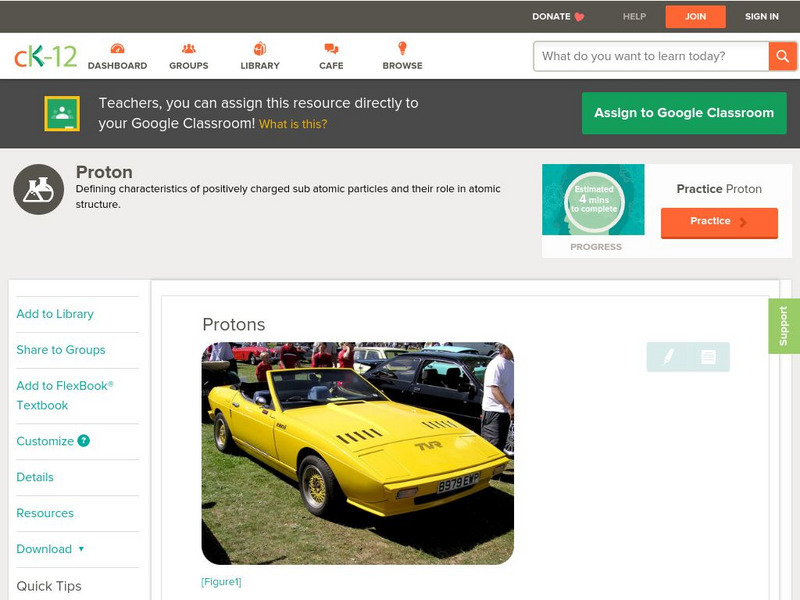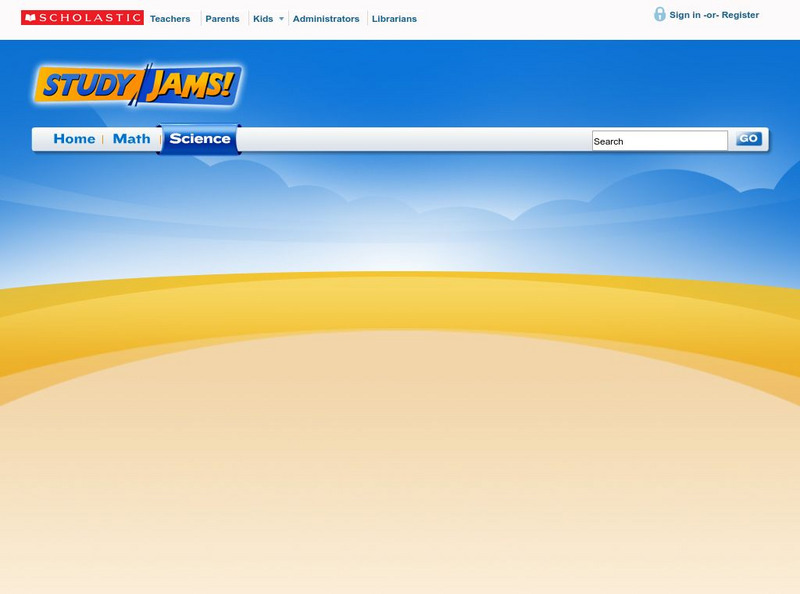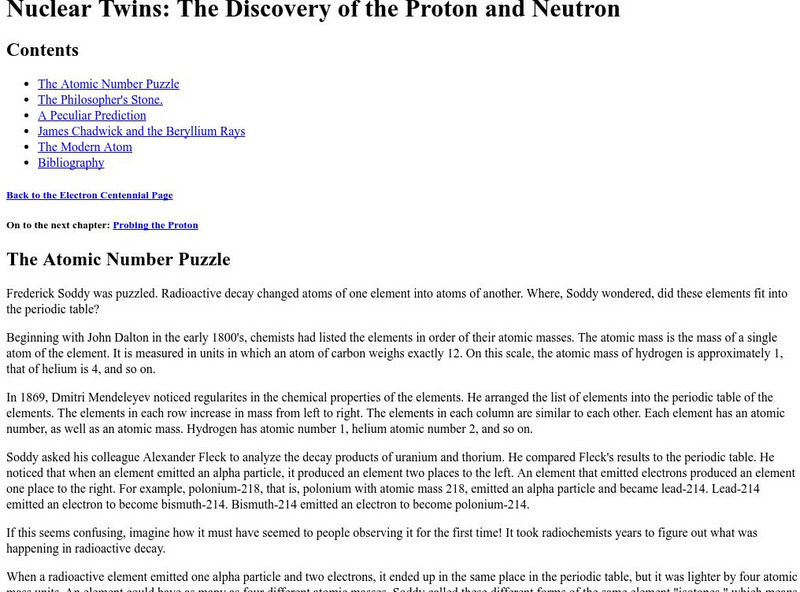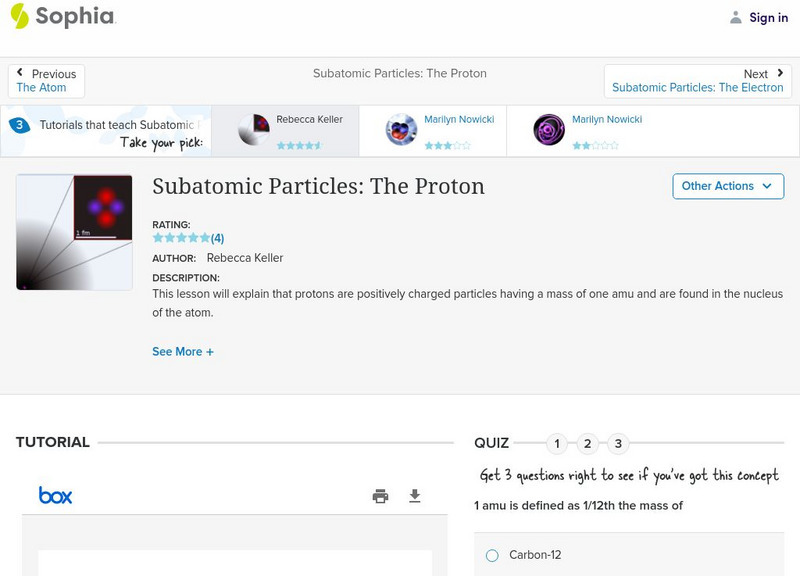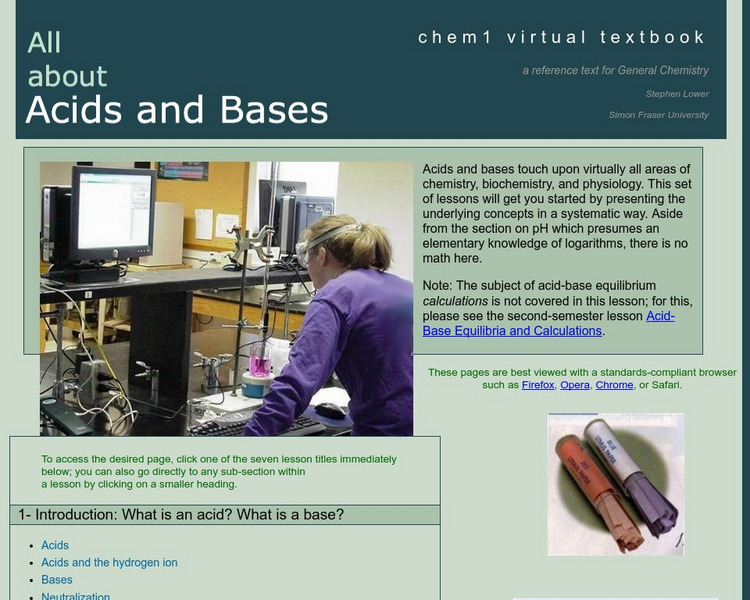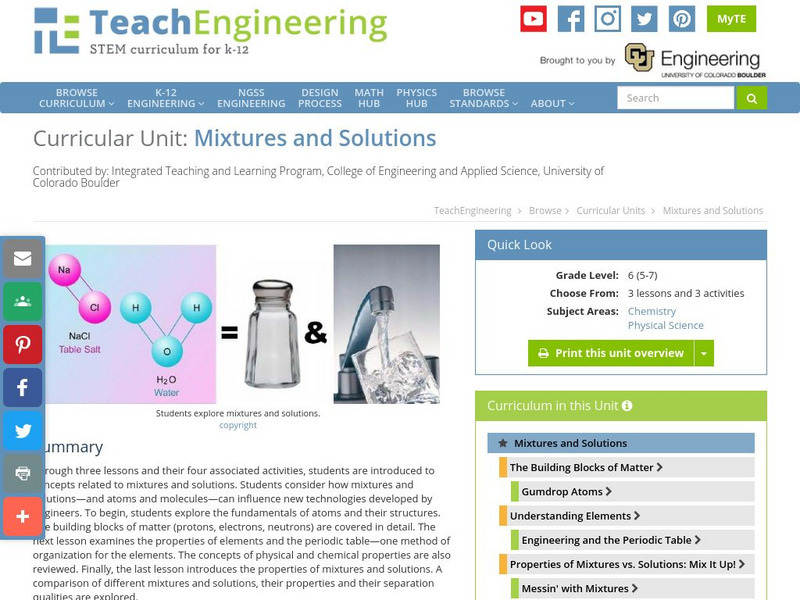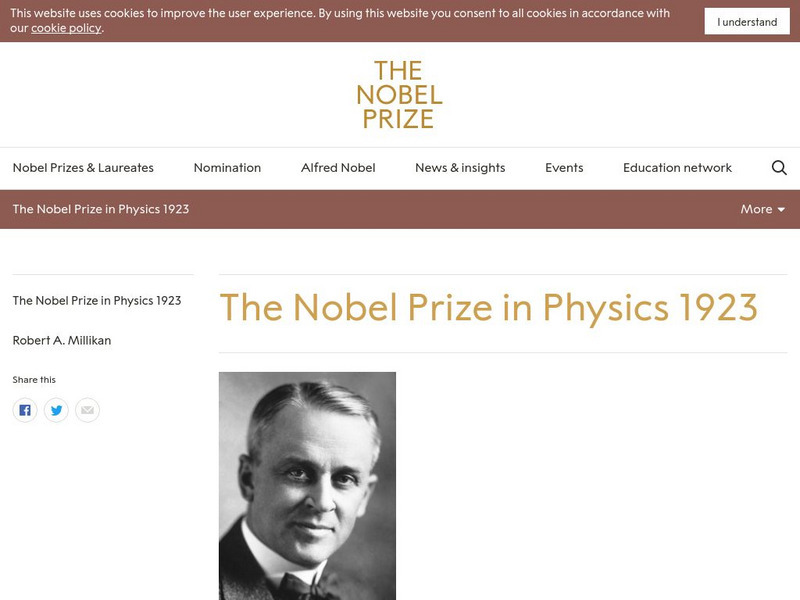Curated OER
Organization of the Elements and Periodic Table
Learners identify how to relate the position of an element in the periodic table to its atomic number and atomic mass. They also identify and interpret how to use the periodic table to identify metals, semimetals, nonmetals, and...
Curated OER
Basic Chemistry Review
Students experiment to show their knowledge of molecules and atomic structures. In this chemistry review lesson students participate in an activity and then fill out a worksheet.
Simon Fraser University
Chem1 Virtual Textbook: Protons and Electron Pairs
Acting as an overview from the General Chemistry Virtual Textbook, this site explores Lewis acids and bases with specific attention directed toward protons and electron-pairs. Other topics covered include proton-transfer reactions...
CK-12 Foundation
Ck 12: Chemistry: Protons
[Free Registration/Login may be required to access all resource tools.] Describes research on the proton and the determination of the weight of proton and electron.
Scholastic
Scholastic: Study Jams! Science: Matter: Atoms: Protons, Neutrons, Electrons
A video and a short quiz on the parts of an atom, the periodic table, and molecules.
American Chemical Society
Middle School Chemistry: Protons, Neutrons, and Electrons
Explore the particles that make up atoms: protons, electrons, and electrons.
American Chemical Society
Middle School Chemistry: Protons, Neutrons, and Electrons
Investigate why a charged object is attracted or repelled by another charged object. Explore the concept that the attraction between positive protons and negative electrons holds an atom together.
Science Struck
Science Struck: How to Find Protons, Neutrons and Electrons
Brief explanations of how to determine how many protons, neutrons, and electrons are in an element.
BBC
Bbc: Gcse Bitesize: What Does the Periodic Table Tell Us About the Elements?
The number of protons in the atom of an element determines its place in the Periodic Table. The number of electrons in an atom is the same as the number of protons. These electrons are arranged in shells or 'energy levels' around the...
Thomas Jefferson National Accelerator Facility
Jefferson Lab: It's Elemental Element Math Game!
Learn how to read the periodic table of elements as you solve these Math questions about the number of protons, neutrons, electrons or nucleons in an atom of an element. You can choose how many questions to answer, and how complex they...
California State University
California State University: Proton, Electron, Neutron
An interesting and useful tool to practice recognition/calculation of atomic number, mass, and number of neutrons, electrons, etc. Can be used with all elements.
Sophia Learning
Sophia: Subatomic Particles: The Electron: Lesson 3
This lesson will explain that electrons are negatively charged particles with negligible mass and are found in pairs in orbitals surrounding the nucleus of an atom. It is 3 of 3 in the series titled "Subatomic Particles: The Electron."
California State University
Csudh Project for Chemistry: Protons, Electrons, and Neutrons
This page is an exercise in relating the number of protons, electrons, and neutrons for an atom or monoatomic ion.
Science Education Resource Center at Carleton College
Serc: Investigating Static Electricity: Creating Lightning on Much Smaller Scale
In this elementary science activity, young scholars will experiment with static electricity using balloons. After investigating how balloons attract and repel various objects, students will watch a simulation of static electricity to...
PBS
Nova: Atom Builder
Find out if you know enough about atoms to build them. The goal of the activity is to build an atom of a particular element by dragging the correct numbers of neutrons, protons and electrons into the atom.
Other
Nuclear Twin: The Discovery of the Proton and Neutron
Trace the history of the discovery of protons and neutrons in this informative site.
Other
American Institute of Physics: Proton Transistor Memory
Describes a new use for hydrogen ions (protons, of course). Shows that protons are not just old hat.
Math Science Nucleus
Math/science Nucleus: Electrons and the Hairy Monster
This animation discusses electrons and the properties of electrons in a storybook format featuring hairy monsters, strange rocks, and fun animations.
Other
University of Kansas: Quarked!: Matter Mechanic
Build elements and molecules using neutrons, protons, and electrons. Choices include helium, carbon, oxygen, aluminum, water, and salt.
Sophia Learning
Sophia: Subatomic Particles: The Proton: Lesson 2
This lesson will explain that protons are positively charged particles having a mass of one amu and are found in the nucleus of the atom. It is 2 of 3 in the series titled "Subatomic Particles: The Proton."
CK-12 Foundation
Ck 12: Real Numbers: Adding Electrons
[Free Registration/Login Required] Students explore real numbers through electrons and protons. Click challenge me to answer practice questions and click learn more to complete a learning module on real numbers.
Simon Fraser University
Chem1 Virtual Textbook: All About Acids and Bases
Acting as an overview from the General Chemistry Virtual Textbook, this site explores acids and bases and various topics connected to them, including electron pairs, proton donors, proton acceptors, acid-base reactions, and more.
TeachEngineering
Teach Engineering: Mixtures and Solutions
This unit covers introductory concepts of mixtures and solutions. Students think about how mixtures and solutions, and atoms and molecules can influence new technologies developed by engineers. The first lesson explores the fundamentals...
Nobel Media AB
The Nobel Prize: The Nobel Prize in Physics 1923: Robert Andrews Millikan
This Nobel website on the life and scientific work of Robert A. Millikan includes a biography, images, and internet resources for further reading and research. Also included are the 1923 "Presentation Speech" which praised Millikan's...
Other popular searches
- Protons, Electrons, Neutrons
- Protons Electrons Neutrons
- Electrons, Neutrons, Protons
- Electrons and Protons
- Atoms Electrons Protons
- Protons Electrons Crossword
- Protons Electrons Neutorns
- Protons Electrons Scales





